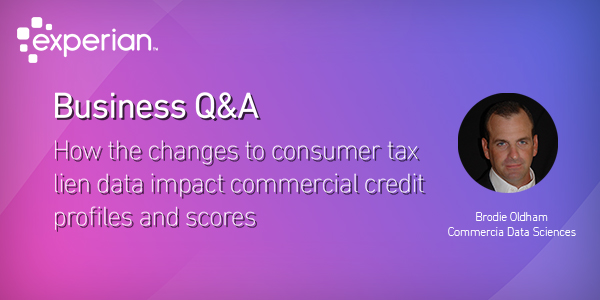
Last year the three primary credit bureaus; Experian, Equifax, and TransUnion announced and implemented enhanced standards for the collection and timely updating of public record data reported on consumer credit reports. This was done in accordance with the National Consumer Assistance Plan requirements. Part of this work involved the partial removal of tax lien data from our consumer credit reporting database.
With the complete removal of remaining tax lien data scheduled for April 16th, some of our clients have asked how these changes might impact commercial credit reports. In this business Q&A I ask Brodie Oldham for some clarification.
What is NCAP and how did it impact Experian’s core credit data?
Brodie Oldham: Gary the NCAP is the National Consumer Assistance Plan and it was put in place by the three U.S. credit reporting agencies Experian, Equifax and TransUnion in response to the U.S. attorney general’s request for clarity and transparency in consumer credit data.
The data that was the main focus was data that did not meet completeness or freshness requirements of data furnishers to the credit reporting agencies. The data that had the most impact from the study was public record data; judgments and liens for consumers that weren’t updated or didn’t have all of the personal identifying data necessary to meet the guidelines. This data is planned to be removed in April of 2018.
Was there impact to Experian’s commercial credit data?
Brodie Oldham: No Gary not an impact to our commercial credit data collected at Experian. We continue to collect that public record information for use in evaluating small businesses through our commercial credit scores. The impact with the public record information is really when we’re evaluating a business owner guarantor using the consumer credit information where public record data has been removed.
What was the impact to commercial blended scores?
Brodie Oldham: The impact is when we’re evaluating small business owners or guarantors using their consumer credit information. When we look at segments where commercial-only data is used there is no impact there because we’re not changing the way that we collect public record information on the commercial side of our business?With the blended scores you would expect that if we remove some of the consumer derogatory information in public records that the score would go up. And we saw a mean lift to about .03 percent, so very small. In the performance of the blended generic credit scores in their evaluation and capture of those delinquent accounts. We saw a very insignificant lift, so the scores are very stable and working well even with the change that we’re having with public records.
Additional Resources:
